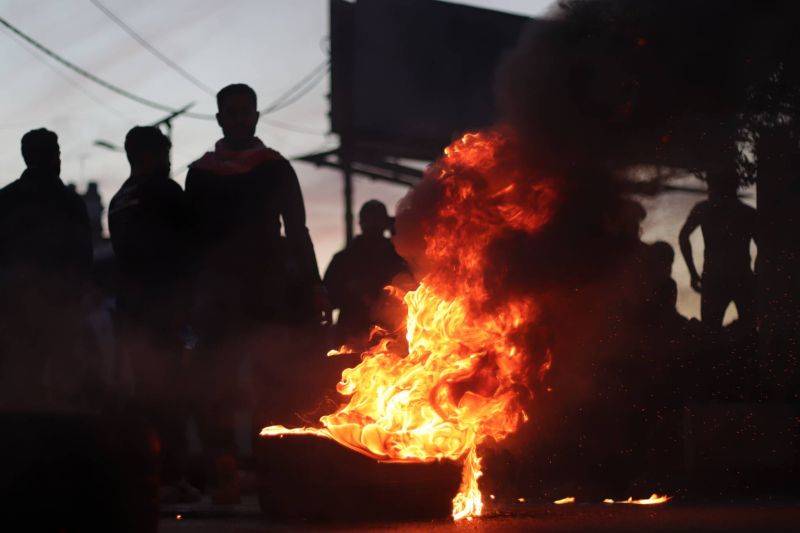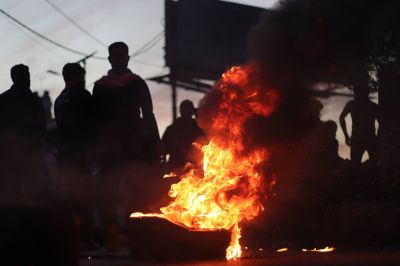
Almost two years after the start of the crisis, the lira has lost 90 percent of its value. (Credit: Omar Bast)
This pressing issue should be at the heart of the political debate. The central bank governor himself warned that only $15 billion remain of BDL’s foreign currency reserves, the majority of which are obligatory reserves.
Under such conditions, maintaining BDL’s subsidy program, which according to caretaker Finance Minister Ghazi Wazni costs $6 billion a year, is fast becoming little more than a fantasy.
The ruling class appears to agree on the need to replace the existing subsidy system, which is based on BDL circulars 530 and 535, covering 90 percent of the cost of imported essential goods such as fuel, wheat, medicine and medical equipment, mostly at the official exchange rate of LL1,507.5 to the US dollar, and on Circular 564, covering the cost of a food basket and certain raw materials at a rate of LL3,900 to the dollar.
But when it comes to making a decision, things get complicated. While political parties have spent the past eight months debating the cabinet lineup, and more recently the sect of the official who will be responsible for secondary education within the Education Ministry, the question of ending subsidies has been relegated to the background.
Subsidies are a thorny issue that would cause discontent among the popular bases of political parties.
The crisis has already plunged 50 percent of the population below the poverty line, according to figures by the United Nations Economic and Social Commission for Western Asia.
On the one hand, ending subsidies without an alternative support system for the most vulnerable families will only worsen the situation.
According to a study by the gas station owners’ syndicate, a total end to subsidies would cause the price of 20 liters of 95-octane petrol to jump from LL41,900 to LL236,000 — or more than a third of the monthly minimum wage, which currently stands at LL675,000.
Tapping into BDL’s obligatory reserves, on the other hand, would also exacerbate the crisis by further isolating Lebanon from international financial markets.
At the end of May, the American financial services company Moody’s said that in the context of a persistent government impasse, dipping into BDL’s obligatory reserves would compromise the relations between corporate banks and their correspondent banks abroad and further jeopardize access to international payment services.
Funding
Faced with these two painful scenarios, the ruling class has, for the moment, opted for procrastination, with no one willing to take responsibility for the situation.
On June 16, a newly formed parliamentary subcommittee chaired by MP Yassine Jaber (Amal bloc/Nabatieh) was charged with looking into the issue.
The subcommittee met on Friday and again yesterday “to discuss the proposals presented by [Free Patriotic Movement leader] Gebran Bassil and [caretaker Prime Minister] Hassan Diab,” Jaber told L’Orient Today.
A law will then be presented to the joint parliamentary committees before being put to a vote in Parliament — a seemingly perilous path in a country where parliamentary committees are often called “cemeteries of laws.”
“The choice between deposits, on the one hand, and subsidies on the other is very theoretical,” said Wael Abu Faour, an MP for the Progressive Socialist Party from the Western Bekaa-Rashaya district and a member of former MP and PSP leader Walid Joumblatt’s Democratic Gathering Bloc.
“We must find a way to finance a ration card that would target the most vulnerable along the lines of the 2011 National Poverty Targeting Program,” he added, noting that funding could come from cutting back on the state budget or redirecting loans promised to the Lebanon but not yet received to a new targeted subsidies program.
However, not only is Lebanon operating without a budget, with the 2021 finance law having been shelved, but the country also defaulted in March 2020 on its Eurobonds with no prospect for restructuring in sight.
“The subsidies, as they are today, are being absorbed into Syria,” MP Tarek Merehbi (Future/Akkar) said without providing precise figures.
The young MP, however, referred to the smuggling of subsidized products such as petrol and certain foodstuffs — a phenomenon that has increased recently because of the significant price differences between the two countries.
“If we cannot monitor the borders, then we will have to find an alternative to subsidies in a bid to mitigate the impact of ending this support system on the poorest,” Merehbi suggested.
This is an option supported by MP Farid Boustany (FPM bloc/Chouf), who drew up a law for rationing subsidies.
“We are proposing to transfer $100 per month to the poorest citizens via ration card, while gradually lifting subsidies on most products, such as petrol and certain medications,” he said.
Boustany added, “Aid would be distributed in full transparency and without any political interference via the Impact platform, on which candidates would register,” stressing that funds would be allocated based on the individuals’ income as declared to the National Social Security Fund. He added that day laborers would benefit from a specific system.
As for funding, it would depend mainly on donors. “The World Bank is ready to help us finance the program,” Boustany said.
At the beginning of June, Ferid Belhaj, the World Bank Group’s vice president for the Middle East and North Africa, said his organization is willing to provide additional funds to support vulnerable families affected by the economic situation, “provided a social safety net project is implemented.”
In March, a $246 million loan from the World Bank to finance a hypothetical social safety net targeting about 150,000 families was approved by Parliament, but not without questions about the level of transparency that would be observed in disbursing the aid, how the aid would be distributed, whether this would happen in dollars or lira, and what exchange rate would be used.
Not a single penny
Three months later, the project has yet to materialize. For experts, this is not surprising.
“In Lebanon, the political class has long made the decision to stop doing anything,” said Carmen Geha, an associate professor of public administration at the American University of Beirut.
Even today, politicians claim that they want to protect deposits and at the same time keep inflation under control through subsidies, “but they continue to adopt a laisser-faire [policy], as they have done for the past two years,” she added.
“As for donors, they will not give a penny if there are no immediate reforms,” Geha said.
For Fouad Debs, a lawyer and co-founder of the depositors’ union, “it is ordinary people who are paying the price of the state and society’s impoverishment, while the country’s political and financial elite remains unshaken.”
“In the end, I think they will continue to silently lift the subsidies, perhaps freeing up a few dollars just to silence depositors,” he said, referring to BDL Circular 158.
But how to calm the people’s anger?
“Members of political parties will continue to benefit from clientelist networks on which they’ve become even more dependent in times of crisis, and which, ultimately, become cheaper for political groups receiving funding from abroad,” Geha explained.
She believes impoverishing the population is a way for the political class to consolidate its hold on society.
Since the start of the crisis, which has been aggravated by the COVID-19 pandemic and the Aug. 4 Beirut port explosion, traditional political parties have largely refined their clientelist offers.
Hezbollah, for instance, began distributing al-Sajjad ration cards, providing its rank and file with large discounts on basic goods in certain party-affiliated supermarkets.
On the other side of the Lebanese political spectrum, Lebanese Forces leader Samir Geagea praised, in an interview with the website Mena News, his party’s patronage activities through various organizations and initiatives.
“The ruling class could also play the card of sectarian one-upmanship to push essential matters, like the lifting of subsidies, to the bottom of the priority list for the benefit of sectarian mobilization, something that could galvanize people,” Geha explained.
“As for those who do not benefit from this patronage, in the mind of a politician, then too bad for them. … What are they going to do? Start a thawra?” she said, using the Arabic word for “revolution.”
“They’ve already tried this,” she added.
This article was originally published in French in L’Orient-Le Jour. Translation by Sahar Ghoussoub.
